7 Tools for Summarizing Judicial Opinions
Explore seven AI tools that streamline the summarization of complex judicial opinions, enhancing efficiency for legal professionals.
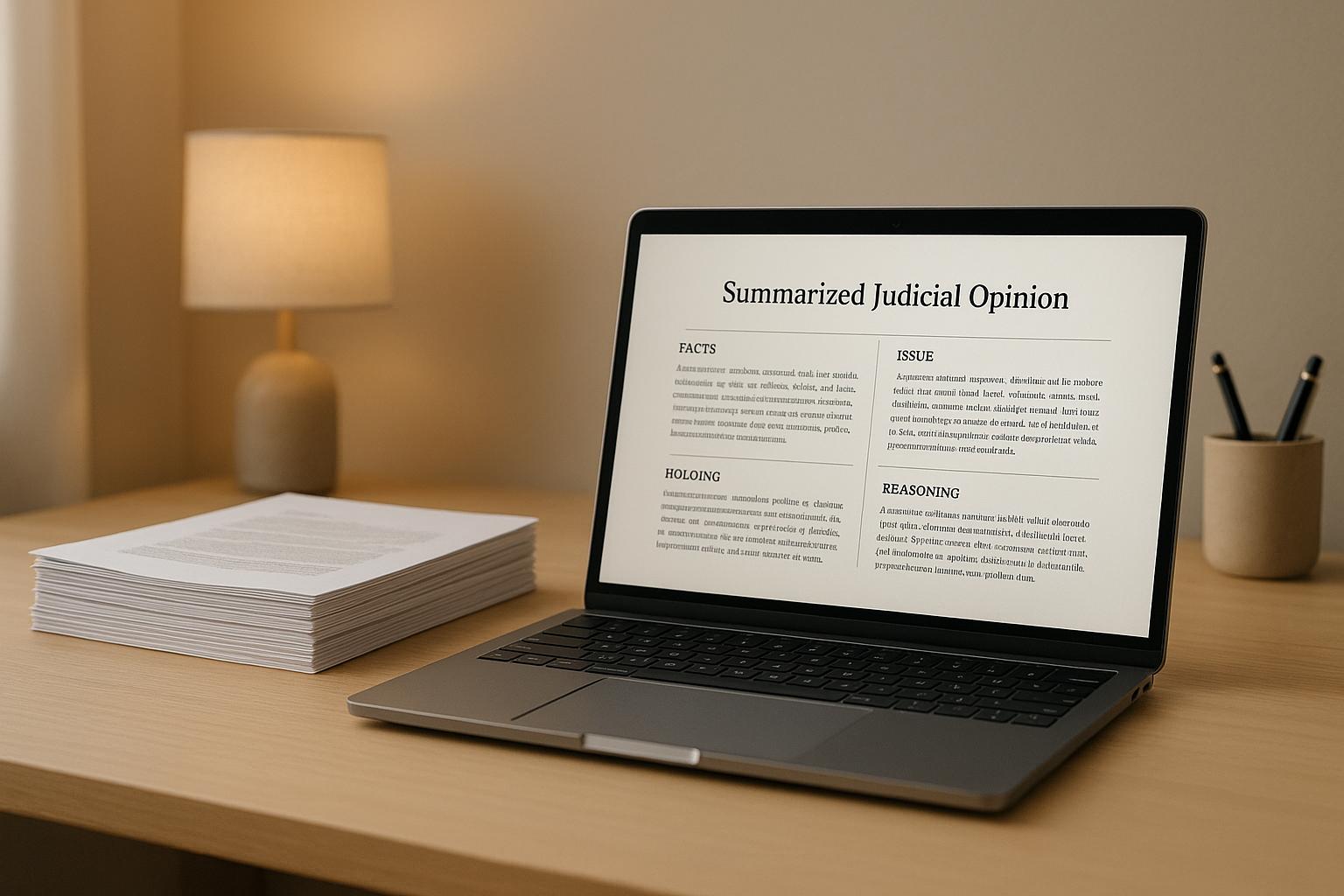
7 Tools for Summarizing Judicial Opinions
Legal professionals often face the challenge of analyzing complex judicial opinions. AI tools now simplify this process, saving time and improving efficiency. Here are seven popular tools designed to summarize judicial opinions effectively:
- Docgic: Offers AI-powered summaries, citation-backed answers, and workflow integration. Pricing starts at $29.99/month for lawyers.
- HyperWrite Legal Case Summarizer: Provides concise summaries and plain-language explanations. Plans start at $19.99/month.
- CaseMap+ AI: Focuses on litigation needs with tailored document summaries and case management. Custom enterprise pricing.
- Lexis+ AI Summarization: Combines legal research with advanced AI, offering jurisdiction-specific summaries. Starts at $306/month.
- CaseMark: Handles large volumes of case materials with customizable summaries. Pay-per-use pricing starts at $25/summary.
- Spellbook: Integrates with Microsoft Word for contract analysis and judicial opinion summaries. Subscription-based pricing.
- ChatGPT for Legal Summarization: A general-purpose AI tool for basic summaries. Free tier available; premium plan costs $20/month.
These tools cater to different needs, from solo practitioners to large firms. While AI enhances efficiency, human oversight remains essential to ensure accuracy and compliance. Below is a quick comparison of the tools:
Lexis+ AI core functions - Summarize a case
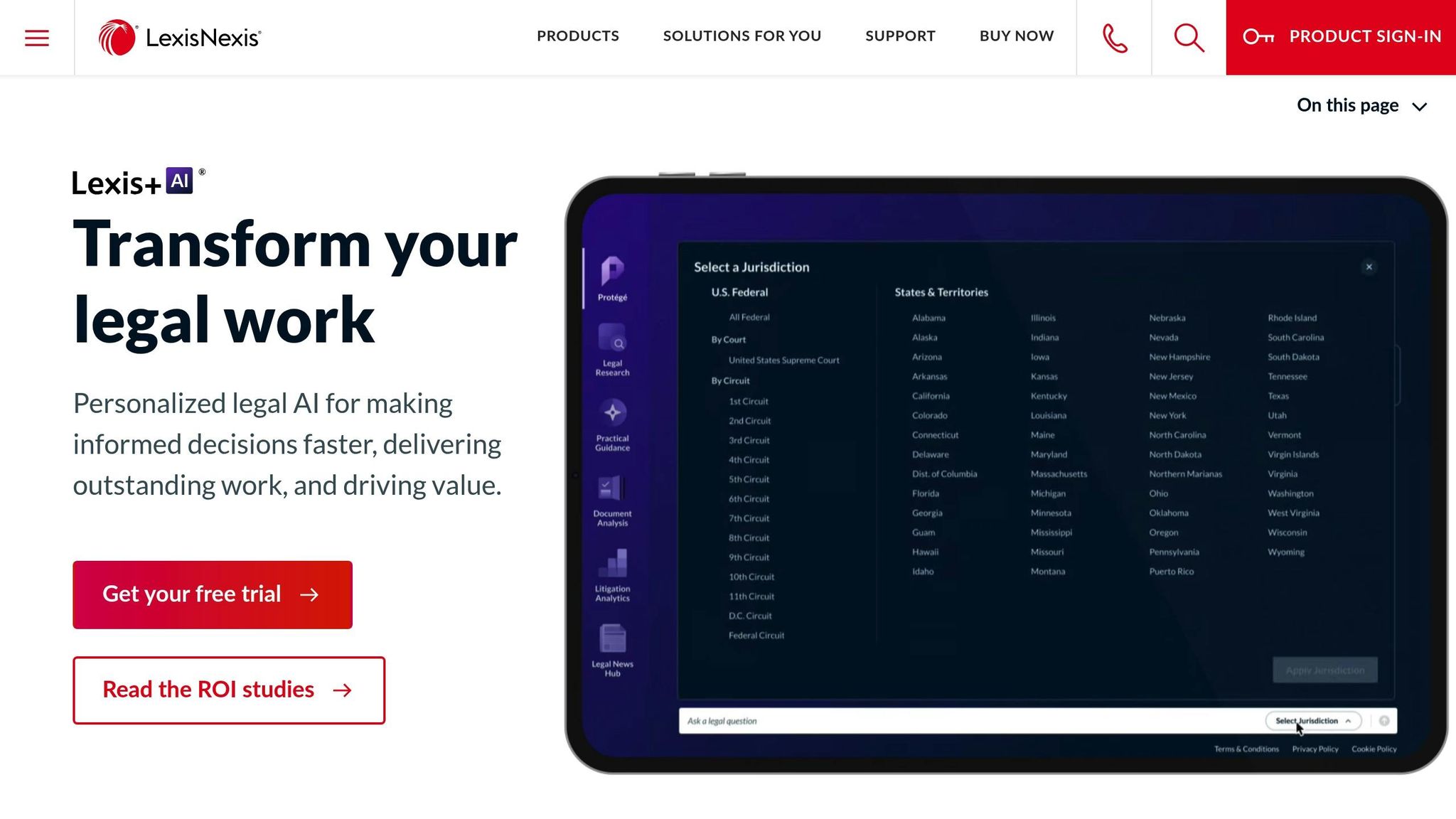
Quick Comparison
| Tool | Key Features | Pricing | Ideal For |
|---|---|---|---|
| Docgic | AI chat, citation-backed answers | $29.99/month | Lawyers and firms |
| HyperWrite | Plain-language summaries, Chrome extension | $19.99/month | Small to medium firms |
| CaseMap+ AI | Case management, tailored summaries | Custom pricing | Large litigation teams |
| Lexis+ AI | Jurisdiction-specific summaries | $306/month | Large firms, legal departments |
| CaseMark | Customizable formats, pay-per-use | $25/summary | Litigation-heavy practices |
| Spellbook | Microsoft Word integration, contract focus | Subscription-based | Transactional lawyers |
| ChatGPT | General-purpose AI, customizable outputs | Free/$20/month | Solo practitioners, small firms |
Each tool offers unique features and pricing structures, making it easier for legal professionals to choose based on their specific needs and budgets.
1. Docgic

Docgic is an AI-powered platform designed to simplify and enhance judicial opinion summarization and analysis. By combining advanced AI with legal tools, it transforms the way attorneys approach document review and case law research.
AI Capabilities for Summarization
Docgic's AI engine tackles complex legal documents like judicial opinions, contracts, and pleadings, extracting key points to create clear and concise summaries.
But it doesn’t stop there - Docgic’s AI also connects legal concepts, identifies relevant precedents, and detects legal patterns to help attorneys build stronger arguments. On top of that, the platform includes an AI chat feature tailored for legal professionals. Attorneys can ask questions about judicial opinions in plain language and get detailed responses, complete with citations.
By using Docgic, attorneys can speed up document review by 85% and reduce errors by 90% compared to traditional manual methods.
These capabilities are designed to integrate seamlessly into the daily workflows of legal professionals.
Integration with Legal Workflows
Docgic fits effortlessly into legal workflows by automatically detecting citations and enriching them with detailed case information from trusted databases. It also provides advanced analytics that track workflow efficiency and offer performance insights, helping law firms analyze their processes and make improvements. For busy attorneys, Docgic replaces hours of research with thorough analysis delivered in seconds.
Pricing and Target Audience
Docgic offers three pricing tiers, catering to different segments of the legal profession:
| Plan | Monthly Price | Target Users | Document Limit | Monthly Credits |
|---|---|---|---|---|
| Law Student | Free | Legal education | 10 documents | 50 credits |
| Lawyer | $29.99 | Practicing attorneys | 200 documents | 500 credits |
| Law Firm | $99.99 | Firms & organizations | Unlimited | 2,000 credits |
All plans comply with attorney-client privilege requirements, featuring per-client document isolation and detailed audit trails for document access. This makes Docgic particularly valuable for law firms that prioritize strict data security and client confidentiality.
2. HyperWrite Legal Case Summarizer
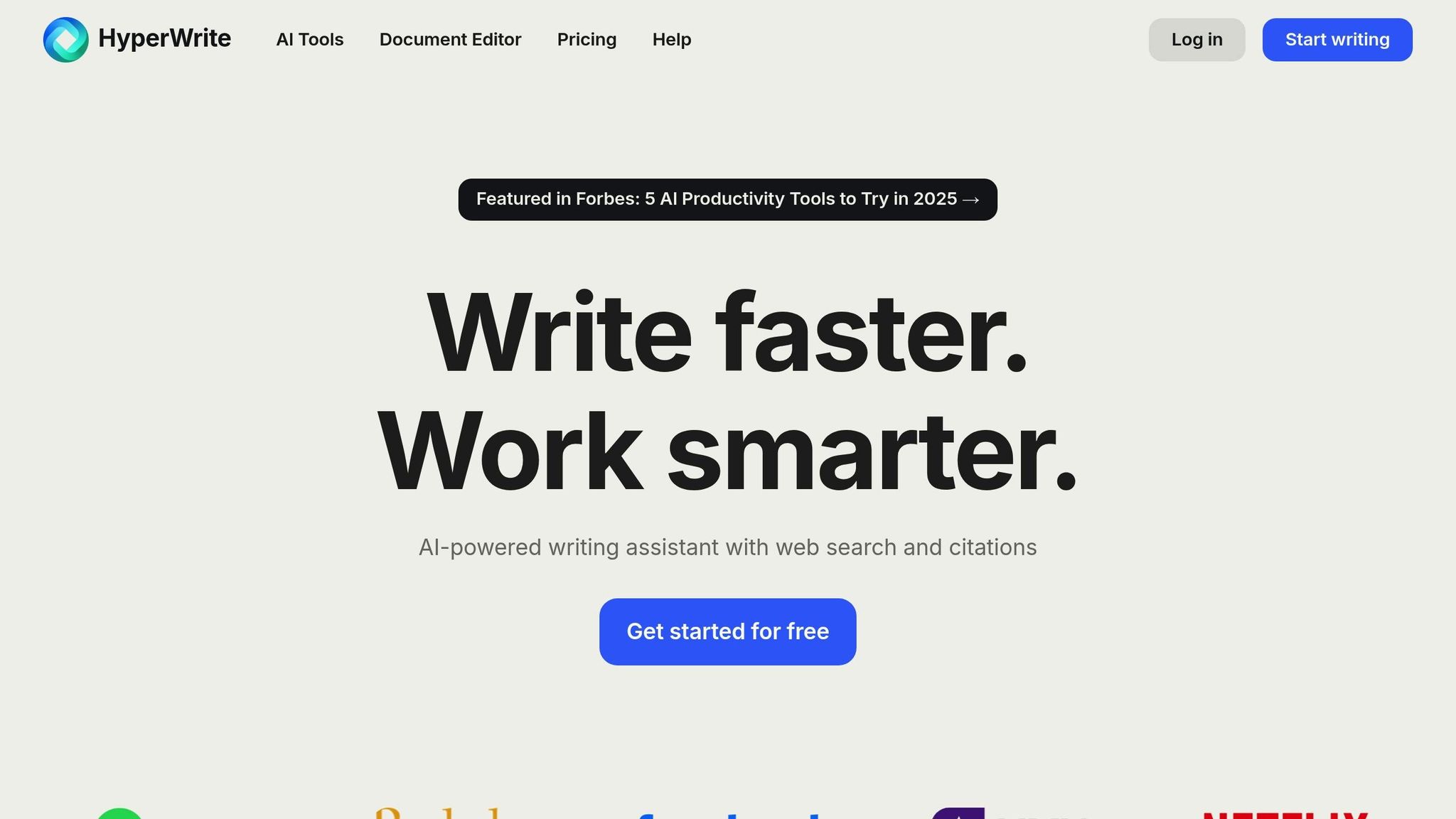
HyperWrite's Legal Case Summarizer simplifies the process of reviewing judicial opinions for legal professionals. By using advanced AI models, the platform condenses lengthy court decisions into easy-to-read summaries. Like many modern legal tools, HyperWrite uses cutting-edge AI to streamline essential legal tasks.
AI-Powered Summarization Features
At its core, HyperWrite's AI engine processes legal case texts and identifies key points, arguments, and conclusions. This allows the tool to produce clear, concise summaries that make complex legal language more approachable.
But HyperWrite doesn’t stop at basic summarization. It offers specialized tools tailored to different legal needs. For instance, the Legal Explainer translates difficult legal terms into plain language. Meanwhile, the AI Legal Brief Summarizer condenses lengthy legal documents into brief, digestible overviews. These features help attorneys handle a variety of document-related tasks all within one platform.
Flexible Summary Customization
A standout feature of HyperWrite is its ability to create customizable summaries. Users can paste documents into the tool, which then generates a concise summary that can be edited as needed. This flexibility ensures that the AI-generated content remains accurate and aligned with the original document’s meaning, giving legal professionals full control over the final output.
Seamless Integration into Legal Workflows
HyperWrite fits seamlessly into existing legal workflows, thanks to its Chrome extension. This allows attorneys to access its summarization tools directly from their web browser. The platform is especially useful for tasks like legal research, drafting case briefs, writing reports, and even legal education. Additionally, its Magic Editor feature helps refine legal writing by improving clarity, tone, and style.
Pricing and Accessibility
HyperWrite offers a free trial for new users. Its pricing includes two main subscription plans: the Premium Plan at $19.99 per month and the Ultra Plan at $44.99 per month. First-time users can also apply the discount code "TRYHYPERWRITE" to get 50% off their first month. These pricing options make the platform a practical choice for solo practitioners, small firms, and legal professionals who need occasional access to AI tools for summarization.
3. CaseMap+ AI
CaseMap+ AI builds on LexisNexis's two decades of experience in case management, a platform trusted by top litigation teams across the industry. This updated version incorporates generative AI to streamline legal workflows by summarizing deposition transcripts and judicial opinions, significantly cutting down the time lawyers spend sifting through lengthy documents.
AI Capabilities for Summarization
CaseMap+ AI is designed to extract key insights from dense legal texts, providing concise summaries that help litigators zero in on the most critical aspects of a case. LexisNexis describes its functionality as follows:
"CaseMap+ AI integrates cutting-edge AI capabilities to empower litigators with efficient tools for organizing, analyzing, communicating, and presenting case information."
The platform also generates interactive topic lists and auto-populates document summaries with tailored synopses, making it easier to navigate through multiple judicial opinions in complex cases. These automated insights ensure that summaries are aligned with the specific needs of each case.
Customization Options for Summaries
CaseMap+ AI offers flexible options to tailor summaries for various legal contexts. Users can create case-specific transcript overviews and receive condensed document summaries that spotlight the most relevant details. This flexibility allows legal teams to focus on specific elements - such as procedural history, legal arguments, or factual details - depending on their strategic priorities.
Integration with Legal Workflows
Beyond its summarization and customization tools, CaseMap+ AI integrates seamlessly with platforms like iManage and RelativityOne, ensuring document integrity while speeding up analysis. The platform centralizes essential case details, including witness lists, case timelines, document indexes, privilege logs, deposition summaries, and key issues.
For example, M Hedayat & Associates, PC utilized CaseMap to prepare for trial in just 24 hours, ultimately securing a favorable verdict. This demonstrates the platform's ability to support fast-paced litigation needs.
Looking ahead, LexisNexis aims to enhance CaseMap+ AI further by incorporating Protégé, its personalized legal AI assistant:
"Our vision is to integrate Protégé, our personalized legal AI assistant, into CaseMap+ AI, enabling users to harness the power of AI to efficiently analyze, strategize, and draft documents." – Sean Fitzpatrick, CEO of LexisNexis North America, UK, and Ireland
The addition of Protégé underscores LexisNexis's commitment to advancing legal research and collaboration. CaseMap+ AI also allows multiple team members to work on case analysis simultaneously without compromising data accuracy. This feature has been especially beneficial for large legal teams, as shown by The Suarez Law Firm, which has relied on CaseMap for over 20 years to prepare effectively for major trials.
4. Lexis+ AI Summarization
Lexis+ AI is a powerful legal research platform that brings together AI-driven summarization and the extensive legal resources of LexisNexis. At the heart of its summarization capabilities is Protégé, a personalized AI assistant tailored for legal professionals.
AI Capabilities for Summarization
Lexis+ AI excels in condensing complex legal documents, such as judicial opinions, into concise summaries that fit various legal needs. Whether users require bullet-point summaries or brief overviews, the platform adapts to specific tasks like analyzing case law or preparing client memos.
One standout feature is its ability to include inline citations that link directly to relevant cases, statutes, and legal sources. These citations are automatically Shepardized, ensuring their validity and reliability. Additionally, users can upload their own legal documents for customized analysis, question answering, and even draft refinement.
Behind the scenes, Lexis+ AI is supported by a team of over 2,000 experts, including technologists, data scientists, and legal specialists. Their combined expertise ensures the platform delivers precise and reliable AI solutions tailored to the unique demands of legal professionals.
Customization Options for Summaries
The platform’s Protégé AI assistant offers extensive personalization options. Legal professionals can tailor settings for their name, role, jurisdiction, and drafting style, ensuring the output aligns with their practice. These settings can be updated anytime, giving users complete control over their summaries.
"Through the Protégé AI Assistant in Lexis+ AI, you can now opt-in to personalization settings that help Protégé produce output that is most relevant to you. Learn how you can customize settings for your name, role, jurisdiction, and drafting style - and revisit these settings at any time."
LexisNexis emphasizes confidentiality, ensuring that any data shared for personalization remains private and does not affect outputs for other users.
Integration with Legal Workflows
Lexis+ AI seamlessly integrates into existing legal workflows. It works with popular Document Management Systems like iManage, NetDocs, and SharePoint, and also offers tools like a secure Vault for document uploads, a mobile app, and Lexis Create+ for drafting directly in Microsoft Word. These features make it easy to incorporate AI summarization into daily tasks.
The platform’s impact is measurable. Legal organizations using Lexis+ AI have reported impressive returns: law firms achieved a 344% ROI over three years, while corporate legal departments saw a 284% ROI during the same period. Firms like Gibbons and Rupp Pfalzgraf have credited Lexis+ AI with helping them handle more cases, focus on deeper analysis, and deliver outstanding client service.
"Lexis+ AI gives legal professionals a significant competitive advantage by driving improved speed, productivity, and work quality gains for law firms and their clients." - Sean Fitzpatrick, CEO of LexisNexis North America, UK, and Ireland
Adding to its user-friendly tools, Lexis+ AI offers a voice-enabled AI experience, allowing legal professionals to interact with summarization tools through natural conversation. This feature simplifies research and enhances efficiency for busy practitioners. With these advanced tools, Lexis+ AI helps legal professionals achieve faster and more accurate case analysis.
sbb-itb-e7d4a5d
5. CaseMark
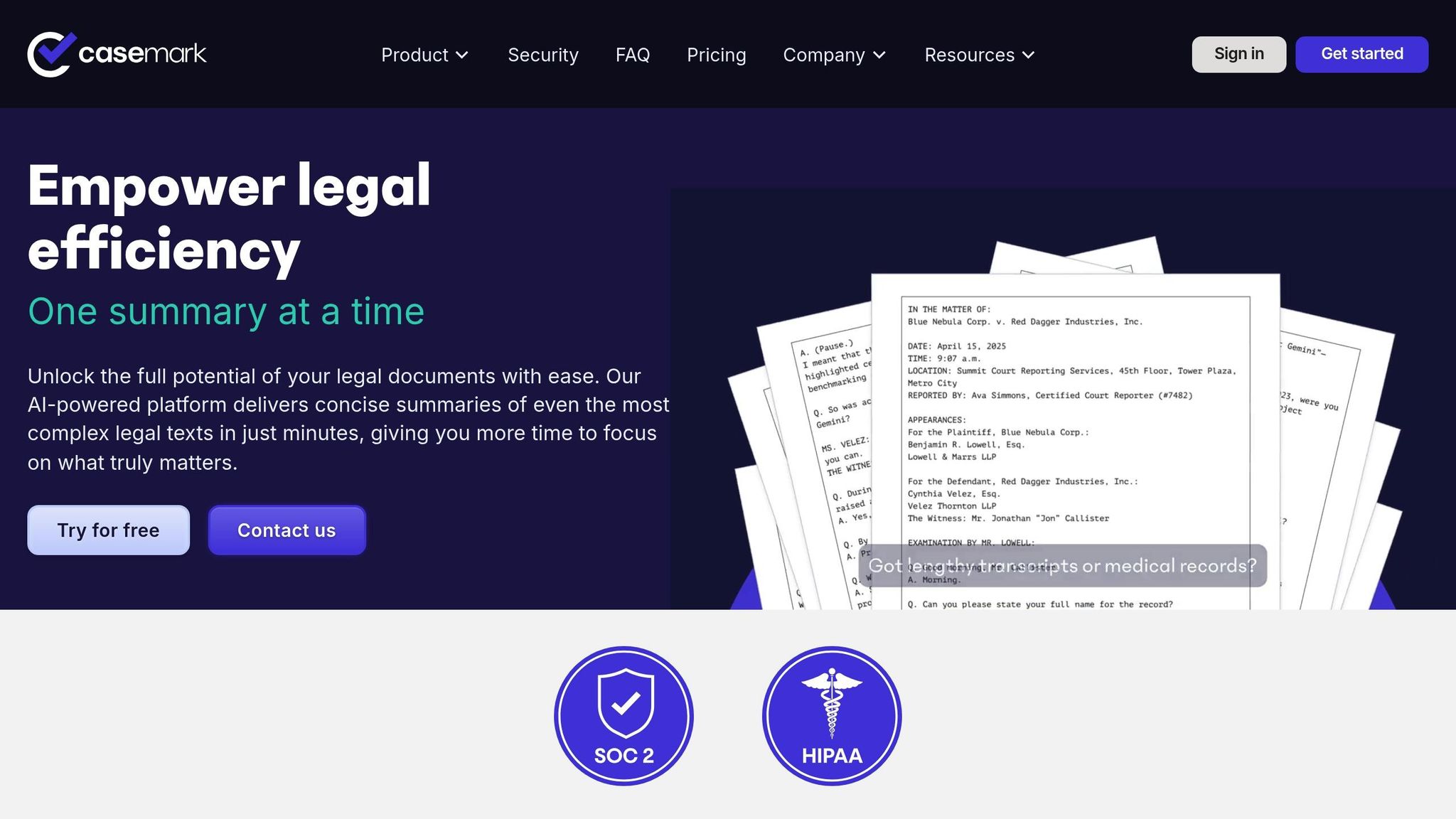
CaseMark focuses on using AI to simplify legal document summarization, catering to trial proceedings, depositions, and other detailed case materials. The platform processes hundreds of thousands of pages annually, making it a go-to solution for law firms dealing with heavy litigation workloads.
AI Capabilities for Summarization
CaseMark's AI engine is designed to handle a variety of legal proceedings, including trials, hearings, arbitration, and mediation. It processes transcripts and allows users to interact through a ChatGPT-like interface for natural language queries. The platform provides ten different summary formats - ranging from narrative styles to comparative layouts - capturing critical trial details such as motions, opening statements, and verdicts.
The AI also incorporates sentiment analysis and entity recognition to highlight essential information, identify communication trends, and flag potential issues. A standout feature is its real-time verification, which cross-checks summaries against source documents, flags discrepancies for review, and identifies missing or inconsistent records.
Customization Options for Summaries
CaseMark offers extensive flexibility, enabling legal professionals to tailor summaries to their specific needs. Whether focusing on key arguments, legal precedents, or particular aspects of motions and pleadings, the platform allows users to create summaries that align with their objectives. With customizable prompt templates and advanced AI tools, legal teams can design workflows and produce summaries at varying levels of detail - from concise overviews for mediation to in-depth analyses for trial exhibits [36, 37].
The platform also adapts summaries based on the type of legal practice, such as family law or employment litigation, ensuring relevant details are emphasized. For cases requiring unique approaches, custom summaries can be tailored to meet exact specifications.
Integration with Legal Workflows
CaseMark integrates smoothly into existing legal workflows through several options. It offers an API for connecting with firm databases, a Chrome Extension, and an upcoming Microsoft Word Add-in. As described by CaseMark:
"CaseMark Workflow is an AI-powered plugin that empowers users within existing workflows. It can quickly summarize and cite selected text, web pages, or tags, seamlessly integrating with Microsoft Word Add-in."
The platform also connects with leading legal case management systems like Clio and Smokeball. Notably, in April 2025, CaseMark became the first embedded partner in Smokeball's AI Apps Marketplace, offering pay-per-use tools like Deposition Summaries and Medical Chronologies directly within case files. Additionally, CaseMark is LLM-agnostic, selecting the most suitable language model for each task to ensure optimal performance. These integration features make it an effortless addition to any legal team's toolkit.
Pricing and Target Audience
CaseMark offers pay-per-use pricing starting at $25 per summary, making it an accessible option for solo practitioners and large law firms alike. Designed for legal professionals managing extensive case materials, the platform automates repetitive tasks, freeing up time for deeper strategic work. As CaseMark puts it, "CaseMark helps you do what you already do, only faster". This makes it particularly beneficial for litigation attorneys, family law practitioners, employment lawyers, and others tackling complex, document-heavy cases.
6. Spellbook
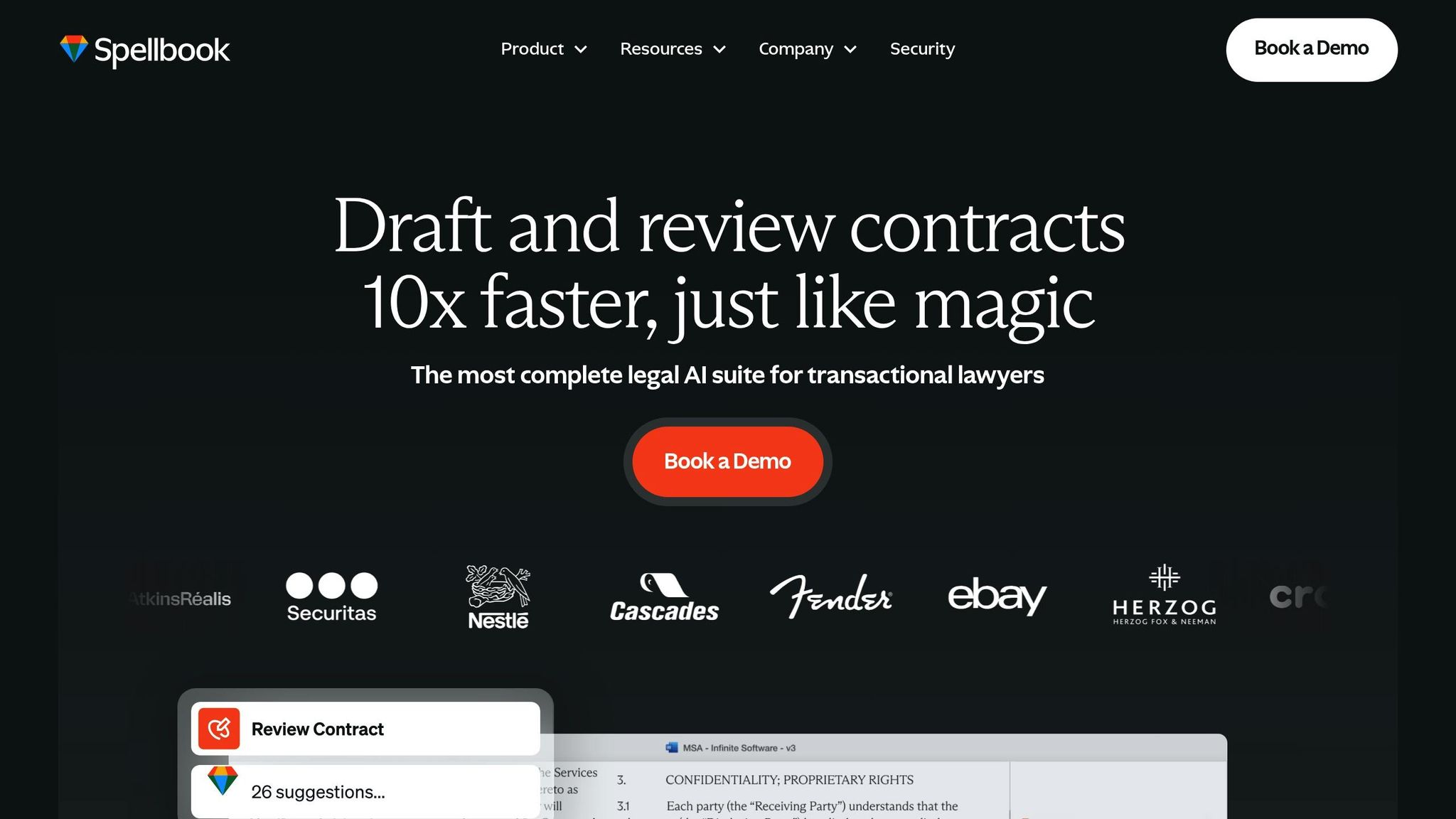
Building on advanced AI integrations in legal case management, Spellbook brings a specialized focus to judicial opinion analysis. Designed specifically for the legal field, Spellbook is trained on billions of lines of legal text and precedents, offering precise summaries of judicial opinions, court transcript analyses, and document reviews. Over 3,000 law firms and in-house legal teams worldwide rely on Spellbook for its accuracy and efficiency.
AI Capabilities for Summarization
Spellbook's AI engine stands out for its ability to extract key details from judicial opinions with a high degree of accuracy. Its exclusive legal training minimizes errors when interpreting court decisions and precedents. The platform ensures proper legal citation formats across different jurisdictions and automatically checks for document consistency by flagging potential errors. This makes it especially useful for summarizing complex judicial opinions. Additionally, Spellbook can speed up the process of brief writing by as much as 70%, thanks to its precise citation formatting and document review features.
Customization Options for Summaries
Spellbook allows legal professionals to tailor summaries to fit their unique writing style and tone. Users can adjust the content to meet specific case or client needs, including jurisdiction-specific requirements to ensure compliance with relevant legal standards. In August 2024, Spellbook introduced Spellbook Associate, an AI-powered agent capable of managing intricate workflows. This tool handles tasks like drafting financing documents from term sheets and performing risk reviews - work typically assigned to junior associates. Such flexibility makes it easy to adapt the platform to various legal scenarios.
Integration with Legal Workflows
Spellbook seamlessly integrates with Microsoft Word, requiring no setup time. It includes pre-built playbooks that automate drafting, reviewing, and ensuring contract compliance. The platform simplifies repetitive tasks, improves accuracy in contract management and document analysis, and scans documents for compliance with applicable laws. It also enhances client communication by generating plain-language emails and issue summaries - an essential feature given that lawyers often spend 40% to 60% of their billable hours on repetitive drafting and review tasks.
Pricing and Target Audience
Powered by GPT-4.5, an AI model that scored in the 69th percentile on the Uniform Bar Exam, Spellbook is designed for legal professionals who need dependable and precise judicial opinion summaries. It’s particularly useful for law firms and in-house legal teams dealing with large volumes of case law research and analysis. By focusing on legal workflows, Spellbook reduces the risk of contradictory interpretations, making it an effective tool for litigation, appellate work, and comprehensive case law research.
7. ChatGPT for Legal Summarization
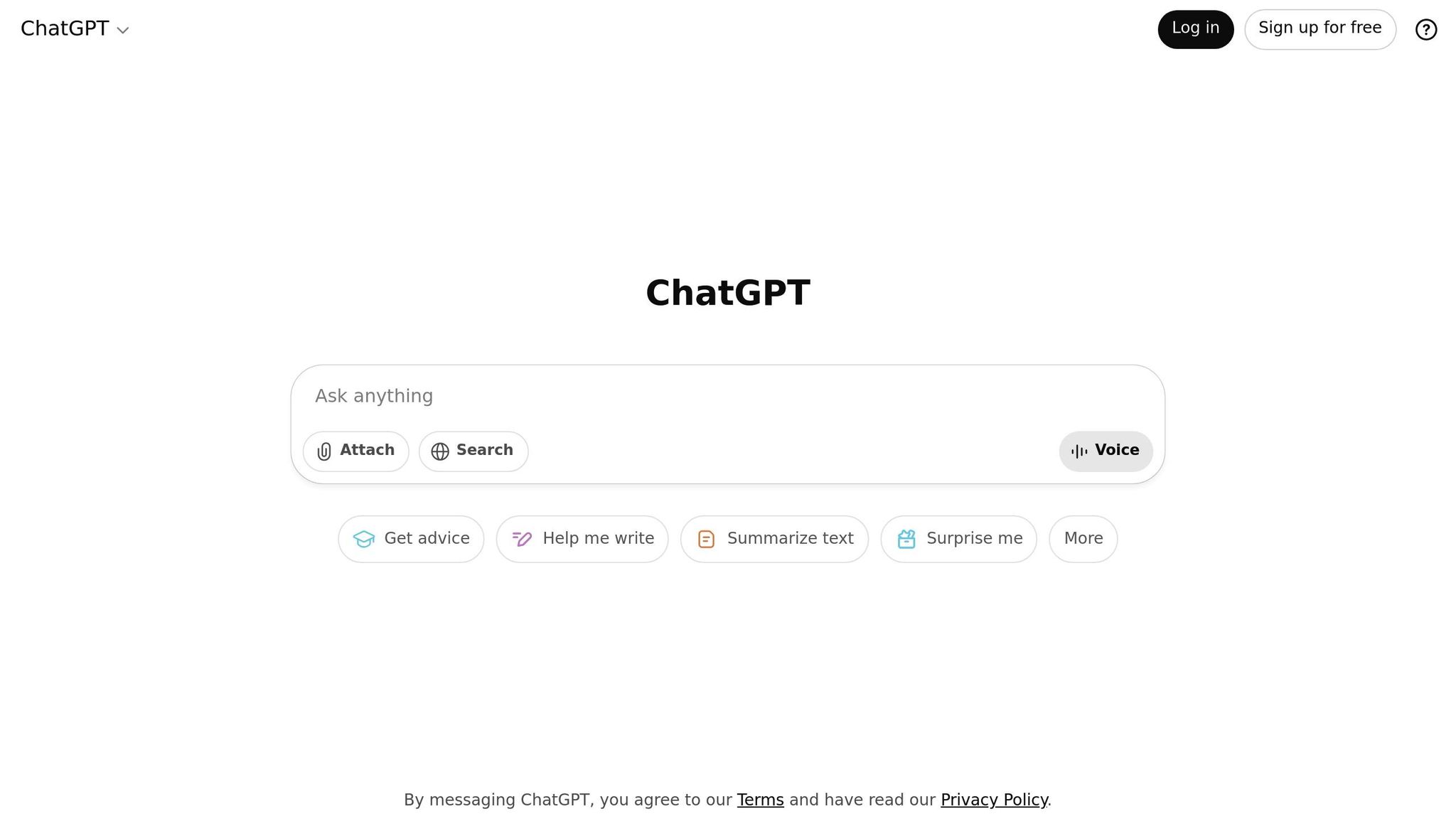
ChatGPT, while not specifically designed for legal tasks, has become a popular tool in legal workflows due to its accessibility and versatility. A survey conducted in March 2023 revealed that 51% of lawyers at large and midsize firms believe generative AI, including ChatGPT, has a place in legal work. However, its use for summarizing judicial opinions comes with both strengths and limitations that legal professionals need to weigh carefully.
AI Capabilities for Summarization
ChatGPT is capable of breaking down complex legal language, generating automated responses, and retrieving relevant information. It can process contracts, pleadings, and case law, extracting key facts and creating concise summaries, legal arguments, or initial drafts.
That said, it has its shortcomings. While it excels at quickly summarizing information, it struggles with the kind of detailed legal analysis and jurisdiction-specific nuances that are often critical in legal work. It can also produce errors, including fabricated citations. A striking example occurred in June 2023, when attorneys Peter LoDuca and Steven A. Schwartz were fined $5,000 by New York District Court Judge Kevin Castel for submitting filings with inaccurate citations generated by ChatGPT.
Customization Options for Summaries
ChatGPT’s Custom Instructions feature allows users to tailor its outputs to specific legal needs. Lawyers can adjust the tone, verbosity, and context, specifying details like jurisdiction, contract type, and key clauses. Responses can also be formatted as tables or bullet points, and users can request citations for factual claims. These customization options make it easier to adapt ChatGPT for specialized tasks, improving its utility in legal workflows [47, 51].
Integration with Legal Workflows
Unlike tools designed exclusively for legal professionals, ChatGPT serves as a general-purpose AI that can assist in drafting, brainstorming, and refining legal documents. Zach Warren, Content Lead for Technology and Innovation at Thomson Reuters Institute, points out:
"Generative AI is smart enough to give a plausible answer to most prompts. From there, the human using the tool should decide whether the material is accurate and edits. It can be a great way to get a solid first draft, even for legal issues."
However, this versatility comes at a cost. ChatGPT’s general-purpose design sometimes results in overly broad interpretations or a lack of depth in its analysis. It may miss the nuanced reasoning required in judicial opinions. Ethical concerns, such as maintaining client confidentiality and accurately interpreting jurisdiction-specific provisions, also need to be addressed. As one U.S. Federal Judge remarked:
"Technological advances are commonplace and there is nothing inherently improper about using a reliable artificial intelligence tool for assistance. But existing rules impose a gatekeeping role on attorneys to ensure the accuracy of their filings."
Pricing and Target Audience
ChatGPT operates on a freemium model, offering basic access for free and premium features through ChatGPT Plus for $20 per month. This pricing structure makes it an attractive option for solo practitioners and small firms with limited budgets. However, its general-purpose nature requires careful human oversight. It’s best suited for tasks like preliminary research, brainstorming, and draft preparation rather than final legal analysis. Since the tool relies on general databases for its information, lawyers must verify AI-generated outputs against authoritative sources. For smaller firms and solo practitioners, ChatGPT provides an affordable entry point, but it demands meticulous review to ensure accuracy and reliability.
Tool Comparison Table
Choosing the right summarization tool involves weighing features, capabilities, and costs. Below is a detailed table comparing various tools to help legal professionals align their choices with specific requirements and budgets.
| Tool | AI Capabilities | Customization Options | Supported Document Types | Security Features | Pricing (USD) | Target Audience |
|---|---|---|---|---|---|---|
| Docgic | AI-powered legal research, instant case law research, document analysis, citation-backed answers, cross-document analysis | Legal-specific AI chat, jurisdiction customization, workflow-specific templates | Judicial opinions, contracts, case law, legal documents, depositions | Legal-grade security, enterprise-grade encryption, secure document handling | Law Student: Free, Lawyer: $29.99/month, Law Firm: $99.99/month | Law students, practicing attorneys, law firms |
| HyperWrite Legal Case Summarizer | Automated case summarization, key fact extraction, legal argument identification | Adjustable summary length, tone customization, format preferences | Case law, judicial opinions, legal briefs, court documents | Standard encryption, secure data transmission | Freemium model with premium tiers | Solo practitioners, small to medium firms |
| CaseMap+ AI | Case timeline analysis, fact pattern recognition, evidence organization, automated summarization | Case-specific templates, custom fact categories, timeline customization | Case files, depositions, discovery documents, judicial opinions | Enterprise security, role-based access controls | Custom enterprise pricing | Large law firms, litigation teams |
| Lexis+ AI Summarization | Tailored summarization for complaints, motions, depositions, contracts | Custom summary templates, jurisdiction-specific formatting, workflow integration | Complaints, motions to dismiss, depositions, contracts, general legal agreements | Enterprise-grade security, compliance certifications | Tiered subscription model, starting at $306/month | Large firms, corporate legal departments |
| CaseMark | Document review automation, key issue identification, precedent analysis | Practice area customization, summary format options, citation preferences | Court filings, case law, regulatory documents, legal opinions | Secure cloud infrastructure, data encryption | Subscription-based pricing | Mid-size firms, litigation support teams |
| Spellbook | Microsoft Word integration, clause drafting, contract analysis, redlining | Jurisdiction specification, document type templates, style customization | Contracts, agreements, legal documents, judicial opinions | Document-level security, version control | Professional subscription model | Contract lawyers, transactional attorneys |
| ChatGPT for Legal Summarization | General text summarization, legal document processing, basic analysis | Custom instructions, tone adjustment, format preferences, citation requests | General text, PDFs, legal documents (with limitations) | Basic data protection, no specialized legal security | Free tier, ChatGPT Plus: $20/month | Solo practitioners, small firms, budget-conscious users |
Key Takeaways from the Comparison
The table highlights notable differences in specialization, security, and pricing. For instance, tools like Docgic and Lexis+ AI focus on legal-specific tasks, offering citation-backed answers and jurisdiction-specific features that general-purpose tools like ChatGPT can't match. A study using the Claude model found that specialized AI tools achieved an impressive 87.13% accuracy in legal classification tasks, emphasizing the value of domain-specific training.
Security is another critical factor. While ChatGPT offers basic data protection, enterprise-level tools such as CaseMap+ AI and Lexis+ AI provide advanced features like role-based access controls and compliance certifications, making them suitable for larger organizations handling sensitive data.
Pricing also varies widely depending on the target audience and feature set. For example, ChatGPT's $20/month plan is ideal for solo practitioners, while Lexis+ AI's $306/month subscription caters to the needs of large law firms. Docgic offers a flexible approach, with a free option for law students and scalable pricing for professionals and firms.
Integration capabilities set certain tools apart. Spellbook integrates seamlessly with Microsoft Word, making it an excellent choice for contract drafting and redlining. Docgic, on the other hand, shines with its cross-document analysis feature, which is particularly useful for complex legal research.
As Catherine Kemnitz, Executive Vice President and Chief Strategy & Development Officer at Axiom Global, aptly puts it:
"The gen AI wrecking ball is clearing the way for something new. Whether we like it or not, it's coming for us all. Ensure your law firm or in-house team is prepared by running hard and smart to stay ahead of it, to shape it, and to transform it from an existential threat into a competitive weapon that amplifies your team's capacity, efficiency, and impact."
The rapid adoption of AI in the legal field is undeniable. In just one year, AI adoption in law firms surged from 19% in 2023 to an impressive 79% in 2024. This transformation underscores the growing importance of selecting the right tools to stay competitive in an evolving landscape.
Conclusion
AI tools for summarizing judicial opinions are reshaping legal research by improving both efficiency and the depth of analysis. By automating tasks like document review, extracting key facts, and offering predictive insights, these tools save time and provide valuable guidance for navigating complex litigation scenarios.
The impact on workflow is striking. For example, one large law firm managed to cut research time from 50 hours to just 10 per case. AI adoption is growing rapidly, with 79% of legal professionals now using these tools in some form. Beyond saving time, these tools enhance the quality of research by identifying potential challenges and surfacing relevant precedents. With natural language processing, they deliver smarter, context-aware search results, while predictive analytics help uncover judicial trends and case timelines.
Madeline Cohen, JD, MLS, and library relations director at Bloomberg Law, captures the essence of this transformation:
"What we want to do at Bloomberg Law is make good attorneys great. And we want to make them the most efficient researchers they can be."
That said, human expertise remains indispensable. These tools are designed to assist, not replace, legal professionals. Verification is crucial to ensure findings are accurate and jurisdiction-specific. There have been instances where AI-generated citations were incorrect, underscoring the importance of double-checking results to avoid costly mistakes.
As technology advances, so does the regulatory framework around its use. By 2025, 16 state bars are expected to address AI and legal ethics, and nine ethics opinions already emphasize lawyers' responsibility to supervise generative AI tools. This reflects the profession's commitment to maintaining ethical standards in a rapidly changing environment.
For legal professionals, the challenge is to strike a balance: leverage AI for efficiency but maintain rigorous oversight. Choose tools that are transparent about their methods, establish clear internal policies for AI use, and ensure team members are properly trained. These technologies represent a significant step forward in legal research, but their true value lies in how they empower attorneys to combine advanced tools with sound professional judgment.
FAQs
How does Docgic use AI to create accurate and reliable summaries of judicial opinions?
Docgic uses cutting-edge AI algorithms to deliver judicial opinion summaries that are precise and trustworthy. By cross-referencing extensive legal databases and backing insights with proper citations, the platform ensures accuracy. It also continuously improves by learning from a massive collection of case law, reducing errors and sharpening its performance over time.
With its AI-driven tools, Docgic simplifies legal workflows, giving legal professionals a reliable solution to analyze and summarize intricate judicial opinions efficiently and with ease.
What are the main advantages of using AI-powered tools to summarize judicial opinions?
AI-driven tools for summarizing judicial opinions bring a range of advantages to legal professionals. They help cut down on time by transforming dense and complex case law into clear, concise summaries, enabling lawyers to spend more energy on analysis rather than sifting through lengthy documents.
These tools also improve precision, minimizing the chance of overlooking key details or citations. Beyond that, they can uncover valuable patterns across multiple cases, offering insights that aid in quicker and more informed decision-making. By simplifying workflows, they make it easier for legal teams to manage large amounts of information effectively.
How do pricing models for AI tools that summarize judicial opinions adapt to the needs of different law firms?
Pricing for AI tools that summarize judicial opinions often depends on the size and unique requirements of a law firm. Smaller firms tend to favor simple subscription plans or flat rates that align with their budgets. In contrast, larger firms typically opt for customized, tiered pricing models that address their more extensive usage and complex needs. Mid-sized firms usually benefit from flexible options that can scale as their demands grow.
These pricing structures aim to deliver affordable solutions, ensuring that firms of all sizes can access tools to boost efficiency and simplify legal processes.

